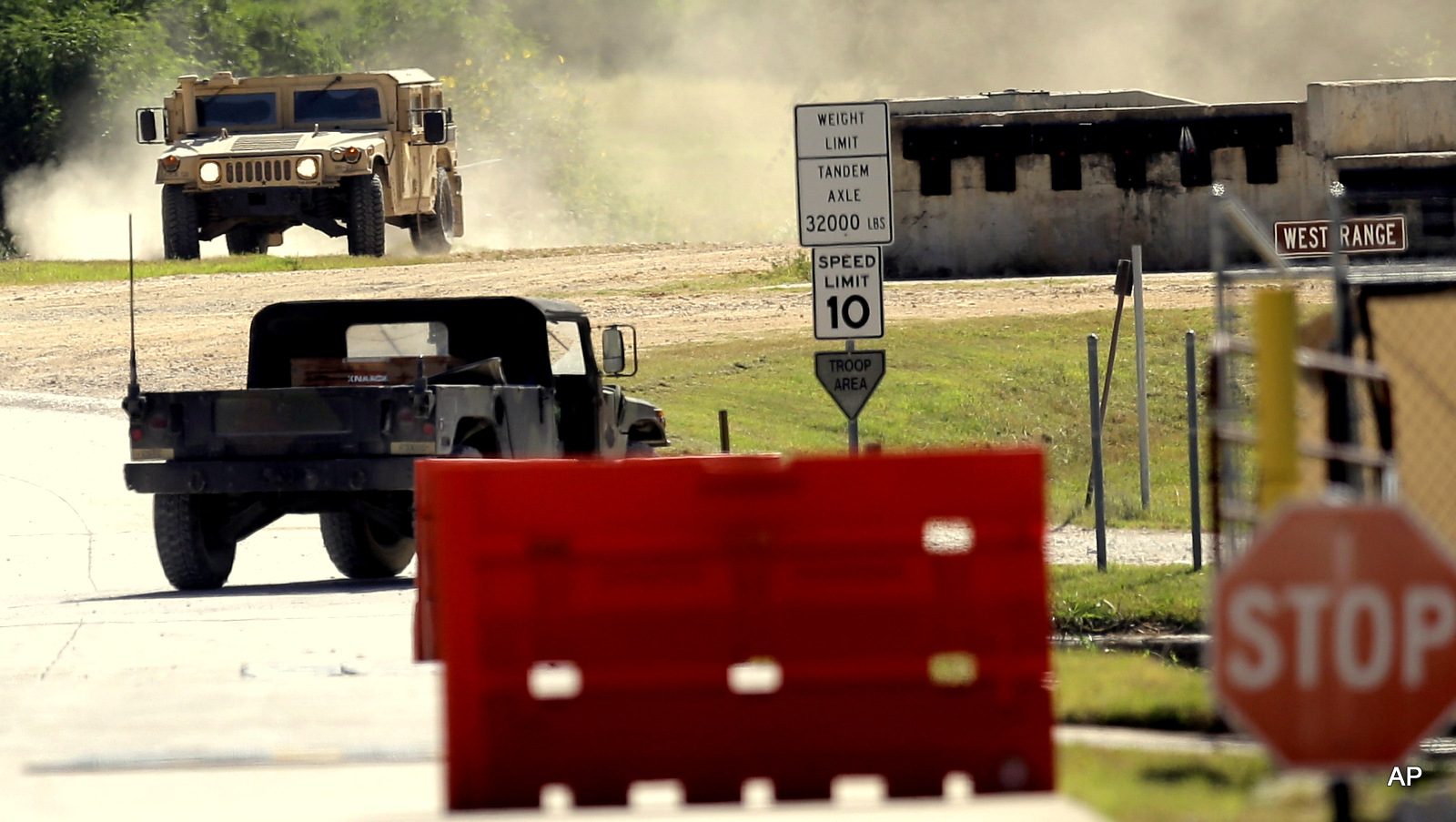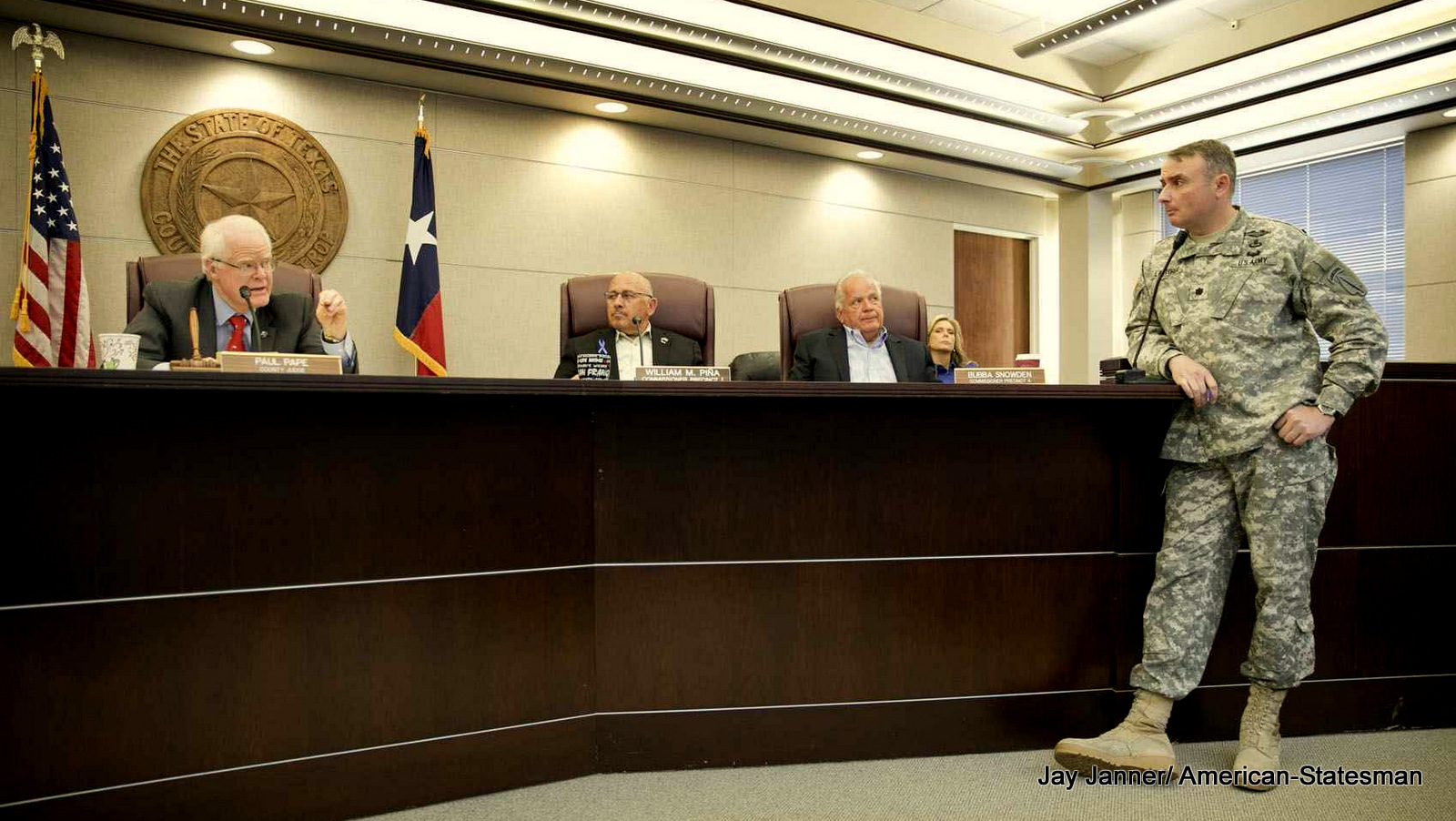The conspiracy theories around the Jade Helm 15 exercise turned into a national joke, obscuring the real issues with the normalization of the police state and possible psychological operations underlying the large-scale military exercise.

Military vehicles are seen at Texas Army National Guard Camp Swift, Wednesday, July 15, 2015, in Bastrop, Texas. Jade Helm 15, a summer military training exercise, that has aroused alarm among some Texans, begins Wednesday outside the Central Texas town of Bastrop.
BASTROP, Texas — After months of media coverage and conspiracy theories about a possible military takeover, the Jade Helm 15 military exercise opened at the Camp Swift Army National Guard Training Center in Bastrop, Texas, with barely a whimper on July 15.
Aside from journalists and a few observers with the Counter Jade Helm project, who were keeping an eye out for troops stationed at local ranches, things were mostly business as usual in Bastrop and at other sites where the exercises will be held through Sept. 15.
Several residents told MintPress News about an increase in helicopter activity in the days leading up to Jade Helm’s launch, but nothing else particularly out of the ordinary for the area around Camp Swift, one of the sites in the seven states where the large-scale training exercise is taking place.
On the day exercises began, Eric Johnston, a retired sheriff’s deputy serving as the Texas coordinator forCounter Jade Helm, told the Austin American-Statesman the group was “performing a neighborhood watch over Jade Helm exercises.”
Johnston said Counter Jade Helm is not interested in conspiracy theories but believes there is a legitimate reason to question the exercise. After attending a briefing with Army Lt. Col. Mark Lastoria, a spokesman for Army Special Operations Command, Johnston concluded that “quite a few things [Lastoria] stated in that briefing … did not add up.”

Eric Johnston, the Texas organizer for the civilian volunteer group monitoring Jade Helm 15 military training exercises, talks on the phone, Wednesday, July 15, 2015, in Bastrop, Texas.
One week before the Jade Helm exercise kicked off U.S. military officials announced that journalists would not be allowed to embed with the military for the exercise, bringing the lack of transparency surrounding the exercise back to the forefront. However, The Washington Post reported Lastoria said that later in the summer the Army might allow “a small number of journalists to view selected portions of the exercise.”
“All requests from the media for interviews and coverage of U.S. Army Special Operations Command (SOCOM) personnel, organizations and events are assessed for feasibility and granted when and where possible,” Lastoria said in a statement released to The Post on July 8. “We are dedicated to communicating with the public, while balancing that against the application of operations security and other factors.”
The Post went on to note that media had previously been granted access to Special Operations activities for reports and books, including the 2011 book “The Wrong War,” by Bing West, and the 2013 work “One Hundred Victories,” by Linda Robinson.
“If there is nothing to hide, why is the media not allowed?” one Bastrop resident asked, reflecting the heightened concern the press ban has inspired among local residents.
Lastoria also says Jade Helm will not be as large as initially described in training materials published online in March. The exercise will reportedly include around 1,200 personnel — with the vast majority being Army Special Operations personnel and additional special operations forces units from the Navy, Marines and Air Force.
Still, the duration of the exercise, volume of personnel, and labeling of areas as “hostile” fanned the flames of Americans’ distrust in government. This was particularly apparent in Texas, where Gov. Greg Abbott announced in April that he would deploy the Texas State Guard to monitor the Army’s activities during the operation.
However, once the exercise began there was little to see in Balstrom and other sites where the exercise is taking place.
Indeed, there was so little going on at Camp Swift that several media outlets were at the scene, attempting to interview anyone even tangentially related to the exercise. Yet most of the Counter Jade Helm observers were not interested in speaking to what they referred to as the “corporate media.”
‘Mastering the Human Domain’
Most media coverage of Jade Helm has been geared toward assuring the American public that there is no reason to fear this or any other military exercise. Yet a closer look at the U.S. government’s growing police and surveillance states shows that everyday Americans are becoming the focus of various “domestic extremism” and “terrorism” task forces.
Citing an “escalating danger from self-radicalized individuals within our own borders,” then-Attorney General Eric Holder announced in June 2014 that the Justice Department would revive a domestic terrorism task force established to share and monitor domestic threats in the wake of the 1995 Oklahoma City bombing. Holder stated that the Domestic Terrorism Executive Committee would work to eliminate the threat posed by violent individuals who may be motivated by anti-government or racist views. The FBI, the National Security Division of the Justice Department, and the Attorney General’s Advisory Committee are in charge of the efforts.
Meanwhile, documents like the Missouri Information Analysis Center (MIAC) report prompt questions about why everyday, constitutionally-protected behavior is becoming criminalized. MIAC is a “fusion center” which connects the Department of Homeland Security with local agencies to share resources and information. The center issued a report in 2009 stating that U.S. citizens could potentially be a domestic terrorist if they support “strong state rights,” or if they hold “anti-abortionist” or “anti-Immigration” views. Opposition to “the collection of federal income taxes” or “the Federal Reserve Banks,” or support of third-party presidential candidates like Ron Paul could also land citizens on government watchlists, according to the report.
One Bastrop resident told MintPress he believes the media coverage of Jade Helm is a sort of psychological operation, or “PSYOP,” designed to gauge the response of the populace to a large military presence.

Lt. Col. Mark Lastoria, of the U.S. Army Special Operations Command, answers questions at a public hearing about the Jade Helm 15 military training exercise at the Bastrop County Commissioners Court in Bastrop on Monday April 27, 2015. An overflow crowd came to the meeting to hear a presentation and ask questions of Lastoria about the controversial military exercise that will take place in several states this summer.
The U.S. military has replaced the term “psychological operation” with “military information support operation,” or MISO, which is defined as:
“Planned operations to convey selected information and indicators to foreign audiences to influence their emotions, motives, objective reasoning, and ultimately the behavior of foreign governments, organizations, groups, and individuals in a manner favorable to the originator’s objectives.”
The public learned more about “psychological operations” in 2008, when WikiLeaks released the U.S. Special Forces counterinsurgency manual:
“PSYOP [Psychological Operations] are essential to the success of PRC [Population & Resources Control]. For maximum effectiveness, a strong psychological operations effort is directed toward the families of the insurgents and their popular support base. The PSYOP aspect of the PRC program tries to make the imposition of control more palatable to the people by relating the necessity of controls to their safety and well-being. PSYOP efforts also try to create a favorable national or local government image and counter the effects of the insurgent propaganda effort.”
The U.S. military was famously caught using “psychological operations” in 2011, when Michael Hastings, writing for Rolling Stone, reported that “the U.S. Army illegally ordered a team of soldiers specializing in ‘psychological operations’ to manipulate visiting American senators into providing more troops and funding for the war.”
The official logo of the Jade Helm exercise features the phrase “Mastering the Human Domain.” According to the U.S. Geospatial Intelligence Foundation, a nonprofit focused on intelligence, Human Domain Analytics is “the presence, activities (including transactions – both physical and virtual), culture, social structure/organization, networks and relationships, motivation, intent, vulnerabilities, and capabilities of humans (single or groups) across all domains of the operational environment (Space, Air, Maritime, Ground, and Cyber).” Essentially, it’s the understanding of anything associated with people and their responses.
“You have to understand the human terrain — Who do I talk to? Where do I go?” Paul Floyd, a senior military analyst for Stratfor, a global intelligence firm based in Austin, Texas, told the Statesman. “You have to put yourself in their shoes as people and understand their motivations. Jade Helm is essentially practicing that.”
Floyd, a former Army Ranger who led Special Operations teams in Afghanistan, also noted “such training is crucial to better prepare troops for unconventional warfare, where it’s not always easy to tell civilians from soldiers, good guys from bad guys.”
Militarization comes home
There is also the issue of normalizing the use of military on American streets, as occurred following the 9/11 attacks, the Boston Marathon bombing, and protests in Ferguson, Missouri. One Bastrop resident told MintPress he does not believe conspiracy theories about Jade Helm 15, but does believe the exercise violates the Posse Comitatus Act, which bans the military from participating in law enforcement activities on U.S. soil.
Such concerns about violations of Posse Comitatus are not entirely unfounded. In 2013, The Long Island Press reported on a Department of Defense rule change that would allow the military to police the streets:
“By making a few subtle changes to a regulation in the U.S. Code titled ‘Defense Support of Civilian Law Enforcement Agencies’ the military has quietly granted itself the ability to police the streets without obtaining prior local or state consent, upending a precedent that has been in place for more than two centuries.

A warning sign is posted at a gate entrance at Texas Army National Guard Camp Swift, Wednesday, July 15, 2015, in Bastrop, Texas.
The most objectionable aspect of the regulatory change is the inclusion of vague language that permits military intervention in the event of ‘civil disturbances.’
According to the rule:
Federal military commanders have the authority, in extraordinary emergency circumstances where prior authorization by the President is impossible and duly constituted local authorities are unable to control the situation, to engage temporarily in activities that are necessary to quell large-scale, unexpected civil disturbances.”
Although much attention has focused on the most outlandish stories related to Jade Helm, the normalization of troops in the streets and increasingly militarized domestic police forces are an important part of the national conversation. Military exercises are nothing new, but according to an Army Special Operations Command Fact Sheet released to Truthout, Jade Helm 15 is one of the command’s largest multi-state exercises to be conducted domestically.
Thomas Mead, an operations planner for the exercise, told City Council members in Big Spring, Texas, that some of the personnel participating in the exercise will come from the U.S. Navy SEALS, U.S. Marine Special Operations Command, U.S. Marine Expeditionary Units, the 82nd Airborne Division, SOCOM, as well as the DEA and the FBI.
By placing military and intelligence officials in the midst of local populations the U.S. military hopes to gain insight into how the public will respond to various stimuli, then it will use that knowledge to determine how to properly respond. A 2014 report by the Guardian outlined a Department of Defense research program that’s using social science to prepare for massive civil unrest. The Minerva Research Initiative saysit partners with universities “to improve DoD’s basic understanding of the social, cultural, behavioral, and political forces that shape regions of the world of strategic importance to the US.”
The Guardian cites a critique of the program by Prof. David Price, a cultural anthropologist at St. Martin’s University in Washington, D.C., and author of “Weaponizing Anthropology: Social Science in Service of the Militarized State,” stating that the Pentagon’s Human Terrain Systems (HTS) program “adapted COIN [counterinsurgency] for Afghanistan/Iraq” to domestic situations “in the USA, where the local population was seen from the military perspective as threatening the established balance of power and influence, and challenging law and order.”
With a growing number of Americans reporting feeling dissatisfied with the U.S. government, it is worth asking whether the U.S. government views its own citizens as threats worth monitoring and studying. Consider these recent comments from Gen. Wesley Clark (ret.) discussing “lone wolf terrorism”:
“In World War II, if someone supported Nazi Germany at the expense of the United States, we didn’t say that was freedom of speech, we put them in a camp. They were prisoners of war. So, if these people are radicalized and they don’t support the United States and they are disloyal to the United States, as a matter of principle, fine. It’s their right and it’s our right and obligation to segregate them from the normal community for the duration of the conflict.”
As long as there’s concern that the government views free speech and free thought as threats to its power, the people of Bastrop, Texas, and the rest of the country will be keeping an eye on Jade Helm 15 and similar military exercises.
No comments:
Post a Comment